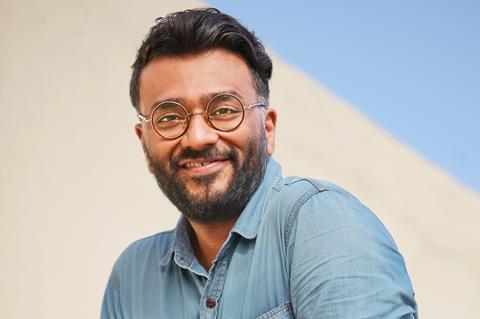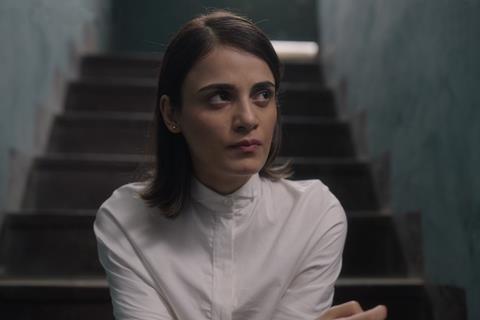
Indian director Sudhanshu Saria is making his return to Estonia’s Tallinn Black Nights Film Festival with social drama Sanaa, which plays in the main Official Selection competition.
It marks the second feature of the Darjeeling-born filmmaker, whose debut Loev also premiered at Black Nights in 2015 before being picked up by Netflix. But while his powerful debut explored queer issues through a romantic road trip gone wrong, Sanaa tackles the subject of female empowerment, following a 28-year-old financial advisor working in Mumbai who finds out she is pregnant on the biggest weekend of her working life.
“Five years back, I was at a dinner and randomly looked around the table and realized I didn’t know anyone who had gotten an abortion even though [statistically] women around me were having a lot of abortions,” says Saria. “I got to thinking about the parallels around abortions and homosexuality – it’s like being in the closet.”
The filmmaker, who also wrote the feature and produced through his Mumbai-based outfit Four Line Entertainment, aims to spotlight attitudes towards abortion and help destigmatise the procedure through his film.
“It’s not like that scar you got because you were cliff-hiking in Machu Picchu, which you will show off because it helps build the narrative around you,” he says. “This is the kind of scar that signals loss of control, like a moment of failure. I kept thinking about my nieces and sisters, all the women so strong and empowered.
“And with the #metoo movement, I also became aware of this [other dimension] of this world – the level of complexity in their daily lives, the caution and negotiation required [to stay safe]. I realised I have to do more as an ally with female-centred storytelling.”
“Daredevil performance”
The main character of Sanaa is played by one of India’s rising actors, Radhika Madan, star of 2018 Toronto winner The Man Who Feels No Pain who gained further awards attention for her supporting role in 2020’s English Medium.

“It’s a tough part and she’s on the screen in every single minute of the film,” says Saria. “It’s a real daredevil performance and a maverick choice. I didn’t get that until a senior member of the cast said, ‘You don’t know what kind of risk you run as a woman in this industry, which puts a shelf-life on you’. For her as a young woman to do this and take this risk where there are chances of it not working out – that’s pretty bold.”
Saria believes the script helped recruit his stellar cast, which includes legendary leading lady and filmmaker Pooja Bhatt, acclaimed actor and producer Sohum Shah and Shikha Talsania. “I guess it’s kind of true that the script is the hardest thing to crack,” he says. “I feel like when you approach artists with integrity, they can see that on the page.”
His growing pedigree as a filmmaker may have also helped, having won India’s National Award for best directing in the non-feature section with Knock Knock Knock, a 40-minute psychological thriller that premiered at Busan in 2019 before screening at Black Nights and being acquired by global streaming platform Mubi.
Pandemic production
After deciding to produce the film himself, Saria’s next biggest challenge was to shoot in the middle of the Covid-19 pandemic.
“January [2022] is when Omicron happened so I’m heading into the shoot as all these new waves are coming and I’m completely aware that there is no back-up,” he recalls. “If someone gets infected, I’m not a studio that can absorb that delay. It’s an incredibly complicated permutation of cast and crew and every day you had to go, be excited and make it happen.”
For Saria, the early days of shoot were the most nerve-wracking as the most difficult sequences had purposely been front-loaded onto the early part of the shoot.
“Because if there’s a problem, that’s what you have to reschedule,” he explains. “That’s the stuff you have to rework. It was hectic but as my actors stepped up, we found the tone of the film and they kept delivering fantastic work. At the end of the first week of shooting, I knew we had our movie.”
The film was emotionally challenging for the cast and Saria had a maxim he would repeat when things got tough. “I would say, ‘You know it will help, right?’. It’s almost like you had to remind yourself why you were putting everyone through so much discomfort. We’re trying to help. I feel like that is the purpose of good art.”
The film shot in Mumbai and wrapped in mid-April. Sanaa will receive its world premiere in Tallinn this evening (November 16).
Tackling censorship
Producing the film himself was an intentional move by Saria to assure freedom of expression.
“Censorship, self-imposed or otherwise, is happening a lot as more and more people are worried about upsetting the trolls and outside influence,” he says. “It’s a privilege to be able to arrange a situation like this but I really fought hard to make that happen so I could make the film in a vacuum, take it out and see who wants to distribute it.”
Before returning to India to tell his own stories, Saria worked in LA as an acquisitions, development and sales executive for companies like New Films International and Peace Arch Entertainment where he helped develop, pre-sell, finance and distribute titles such as Showtime drama The Tudors and Scott Prendergast’s 2007 comedy Kabuley.
“There’s so much pressure on female-driven stories. The failure of one signals the end of 10. And you don’t want to disrespect your audience - you want to be completely sensitive and respectful,” he says, noting he has no interest in making stories that merely celebrate women as idealized heroes.
“That’s oppressive in its own way. It’s the best trick of patriarchy – the virgin, the mother. Because mums can handle anything and are maternal and full of tolerance and sacrificing. I just want to be real,” he says.
After presenting Sanaa in Tallinn, Saria flies back to India to start a three-month shoot on Amazon Prime series Innocence (Masoom), a boarding school story about a gang of girls. He will then begin work on The Trap (Ulajh), a female-led espionage thriller for Junglee Pictures. He is also writing and co-producing season three of Netflix’s Emmy-winning series Delhi Crime, which centres on a female police officer in a male-dominated world.
“These are my ally-ship years,” he adds. “It started with Sanaa, which is a five-year-old commitment.”






![The Brightest SunScreen[Courtesy HKIFF]](https://d1nslcd7m2225b.cloudfront.net/Pictures/274x183/3/5/0/1448350_thebrightestsunscreencourtesyhkiff_312678.jpg)


















No comments yet